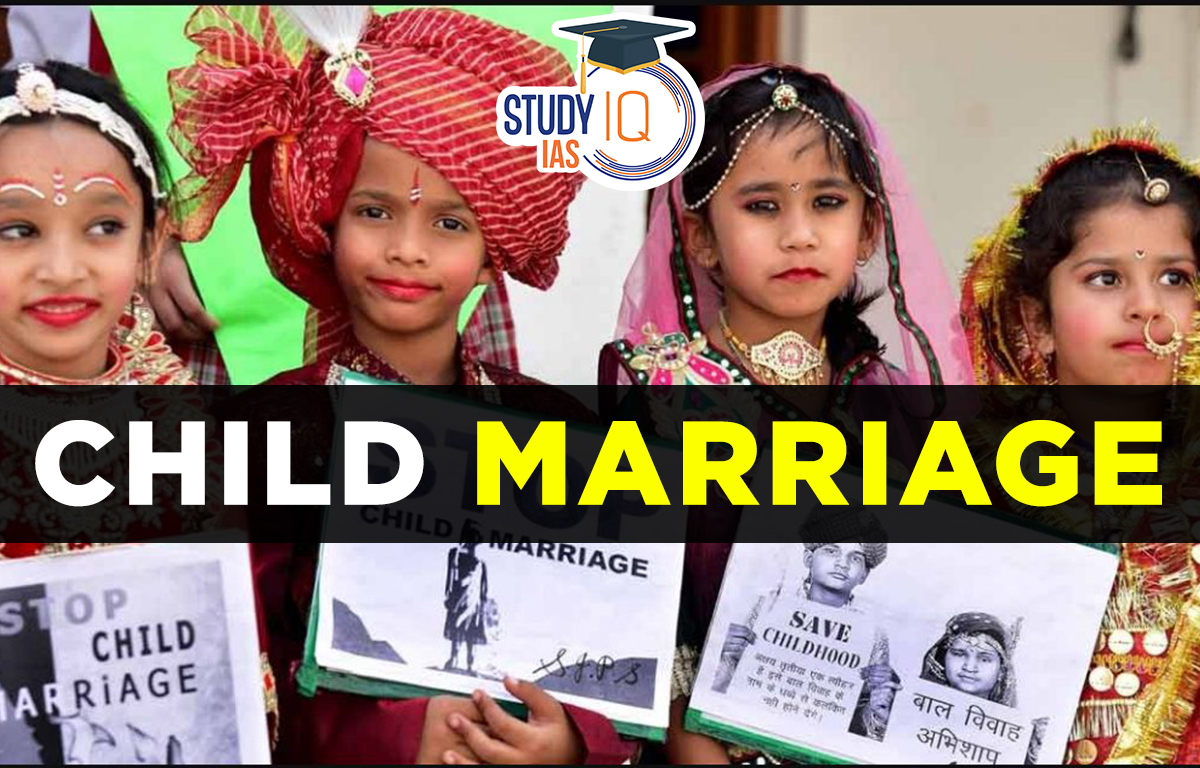Table of Contents
Context: Assam has arrested over 2000 men under the provisions of the POCSO Act and the Prohibition of Child Marriage Act in a state-wide crackdown on child marriages.
About the News
- People who participated in child marriage in the last seven years will be retrospectively booked.
- The arrests have come against the backdrop of the growing debate on the minimum age of marriage of Muslim women.
Debate on the Muslim Age of Marriage
- Under Muslim personal laws, the marriage of a bride who has attained puberty is allowed. Puberty is presumed, in the absence of evidence, on completion of the age of fifteen years.
- This gap between Muslim personal law and legislations prohibiting child marriages or the sexual activity of minors puts a shadow on criminality in such marriages.
Personal Laws of Other Religions
- The Hindu Succession Act of 1956 lays out guidelines for property inheritance among Hindus, Buddhists, Jains and Sikhs.
- The Parsi Marriage and Divorce Act of 1936 lays out rules to be followed by the Parsis according to their religious traditions.
- The Hindu Marriage Act of 1955 codified laws related to marriage among Hindus.
What are the Laws under which the arrests are being made?
- Men who married girls below 14 years of age would be booked under the Protection of Children From Sexual Offences(POCSO) Act, and those marrying girls between 14 and 18 years would be booked under the Prohibition of Child Marriage Act(PCMA).
POCSO Act:
- The POCSO Act, of 2012 criminalises sex between a minor and an adult. The law does not recognize a minor’s consent as valid.
- Sexual assault under POCSO is a non-bailable, cognisable offence (police can make an arrest without a warrant).
- So, a presumption of sexual assault is made in cases of child marriage involving minor girls below the age of 14.
- Sexual assault, which is not penetrative, carries a minimum imprisonment of three years that may extend to five years with a fine.
- Under Section 19, the Act imposes a “mandatory reporting obligation” which requires every person who suspects or has knowledge of a sexual offence being committed against a child must report it to the police or the Special Juvenile Police Unit. Failure to do so will result in imprisonment, a fine, or both.
PCMA, 2006:
- It says that child marriages are illegal but not void. They are voidable at the minor’s choice if he/she petitions the court to declare the marriage null and void.
- The Act stipulates 18 years as the minimum marriageable age for women, while for men it is 21 years.
- The Act punishes child marriage with rigorous imprisonment which may extend to two years or with a fine which may extend to one lakh rupees or both.
- The punishment also extends to anyone who performs, conducts, directs, or abets any child marriage.
What have been the trends in the Central Government’s stand on permissible age of marriage?
- At the time of India’s independence, the minimum marriageable age stood at 15 years for females and 18 years for men.
- In 1978, the government increased it to 18 for girls and 21 for men.
- In 2008, the report of the Law Commission recommended the minimum marriageable age for both men and women to be 18.
- In 2020, the Jaya Jaitly Committee was established by the Ministry of Women & Child Development which also recommended the same in light of factors like reproductive health, education, etc.
- The Prevention of Child Marriage (Amendment) Bill 2021, yet to be passed by the Rajya Sabha, has attempted to raise the marriageable age for women across all religions, from 18 to 21 years.
Supreme Court on the Issue
The Supreme Court is currently examining this issue since different High Courts have ruled differently on it.
- The Punjab and Haryana High Court through various rulings has held that a Muslim girl can legally marry after attaining puberty. Often, the family of such girls file a case under POCSO alleging rape even when the minor girl has decided to marry or elope on her own volition.
- In October 2022, the Karnataka High Court quashed a POCSO case against a Muslim man who was arrested after a hospital made mandatory disclosures under the law when his pregnant wife, aged 17 years and two months visited a doctor.
- In November 2022, another bench of the Karnataka High Court, while noting the incongruity in law, granted bail to a Muslim man arrested under similar circumstances.
- However, in January 2013, the Karnataka High Court ruled that the Prohibition of Child Marriage Act will have an overriding effect on the provisions of Muslim personal laws where a girl can marry upon attaining puberty, as was the case of a 17-year-old girl in “Seema Begum vs State of Karnataka.”
Measures to Prevent Child Marriage
- The Government has enacted the ‘Prohibition of Child Marriage Act (PCMA), 2006’ for the prohibition of solemnisation of child marriages.
- The Government also undertakes awareness drives, media campaigns and outreach programmes and issues advisories to the States/ UTs to highlight the various issues about this evil practice.
- The Ministry of Women and Child Development implements the ‘Beti Bachao Beti Padhao (BBBP)’ scheme, wherein women and society at large are made aware of gender equality and the ill effects of child marriages.
- The Government has introduced CHILDLINE with short code 1098, a 24X7 telephone emergency outreach service for children in crisis, which responds with suitable interventions to calls for any form of assistance which a child requires, including for the prevention of child marriages in coordination with police, CMPOs, District Child Protection Units etc.
- The National Commission for Protection of Child Rights (NCPCR) undertakes various activities and programmes from time to time with concerned stakeholders/ organizations such as representatives of Child Welfare Committees (CWC), Police, Women and Child Development Department and Civil Society organizations on the issue of child marriages and related matters.
International Conventions
- The United Nations (UN) Convention on Consent to Marriage (1962)
- Minimum Age for Marriage and Registration of Marriages (1962)
- The UN Convention on the Elimination of All Forms of Discrimination against Women (1979)
- The Beijing Declaration (1995)


 Daily Quiz 17 April 2025
Daily Quiz 17 April 2025
 Nilgiri Biosphere Reserve, Map, Climate,...
Nilgiri Biosphere Reserve, Map, Climate,...
 Complete List of Indian State Animals
Complete List of Indian State Animals





















